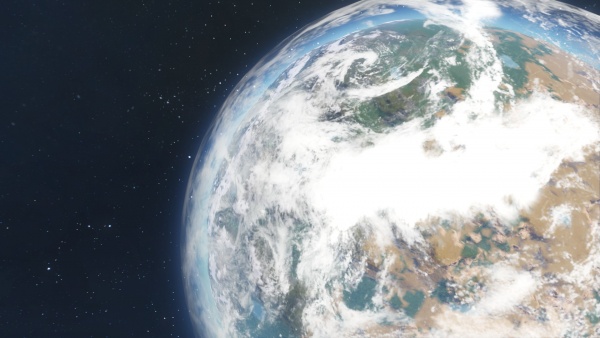Difference between revisions of "Planet"
m (→Hazards) |
m (→Gravitational Field) |
||
| Line 53: | Line 53: | ||
=== Gravitational Field === | === Gravitational Field === | ||
| + | ---- | ||
<A general explanation of how planet gravity and its effects work. Heavily detailed information about natural gravity should go into the link below> | <A general explanation of how planet gravity and its effects work. Heavily detailed information about natural gravity should go into the link below> | ||
:* [[Gravity#Natural_Gravity|Mechanics - Natural Gravity Explained]] | :* [[Gravity#Natural_Gravity|Mechanics - Natural Gravity Explained]] | ||
Revision as of 16:25, 13 March 2016

Contents
Overview
Planets are destructible voxel objects with their own Gravity field, atmosphere, vegetation, and hostile life. They are similar to Asteroids in they contain fully destructible, and have randomly generated Ores, but that's where their similarities end. Planets range in size from 19km to 120km in diameter. By default, each planet comes with it's own accompanied Moon, unless manually spawned in by a player.
Surface Generation
While their surface appears randomly generated, they're in fact pre-loaded voxel models. There is no procedural generation with Planets or Moons. When the size of the Planet is increased, it actually stretches the models to accommodate for the new size. The textures and vegetation aren't stretched, only the surface model is. Each planet type Earth, Mars, and Alien will spawn the appropriate models and surface textures associated with them. The same properties are applied even when it is spawned in manually by the player via (default) - SHIFT+F10 in Creative Mode.
Ore Generation
| Cobalt Ore | Gold Ore | Ice | Iron Ore | Magnesium Ore | Nickel Ore | Platinum Ore | Silicon Ore | Silver Ore | Stone | Uranium Ore |
| Yes | Yes | Yes | Yes | Yes | Yes | No | Yes | Yes | Yes | Yes |
Surface
(~15 to ~50 Meters): Large horizontal veins of ores with a thickness of a few meters. Each ore patch usually contains 1 to 4 ores. Different ores of the same patch can be found in different height levels. The surface above the ore patches is slightly darker and in a brown-ish color, so they can be easily spotted from a higher position. Dense Grass can make spotting harder. All ice lakes on the surface of a planet contain Ice ores.
Boulders
The ore is hidden inside stone rocks that are spread randomly over the surface. Boulders are all about the same size, they contain about ~20,000 of rare ores up to ~100,000 of iron ore. Under certain conditions, the positions of non-drilled boulders are reset completely, so GPS-Markers on these rocks become void. The rocks are also voxel entities that are separate from the planets voxels. They do overlap the planet in the way that station blocks do.
Hazards
Pirate Bases
Currently only present on:
- Easy Start Earth
- Easy Start Moon
- Easy Start Mars
- Easy Start Alien
Pirate Bases are hostile structures under the Ownership of the Pirate faction. They will periodically spawn hostile ships to attack the player(s) at any given location, and will keep doing so until they or the player is completely destroyed.
The pirate bases are not randomly generated, but instead were placed manually into the world. Each Planet has a set number of these bases, and on it's accompanied Moon for the player(s) to add more challenge/difficulty.
NPCs
Planets are home to NPC's, that will make building or operating on a Planet much more challenging or interesting. Their aggressiveness, spawn timers, and numbers range differ from each other. The engineers location does not matter, they will spawn in any environment on the Planet surface. Listed below are the NPC's in the game:
| NPC | Location | State | Drops Items? | Spawn Radius |
| Sabiroid | Alien (Planet) Titan (Moon) | Hostile | Yes | 3-10m
|
| Cyberhound | Earth (Planet) | Hostile | Yes | 500-1000m
|
Gravitational Field
<A general explanation of how planet gravity and its effects work. Heavily detailed information about natural gravity should go into the link below>
Thruster Behavior
<Explanation on how natural thrusters affect Ion thrusters and how they differ from Atmosphere ones>
Planet Variants
<Explanation of planets having different types>
There are three types of planets, as follows. Earth, Mars, and Alien.
Earth-Like
<Summary here>
Mars
<Summary here>
Alien
<Summary here>
 This article is a
This article is a